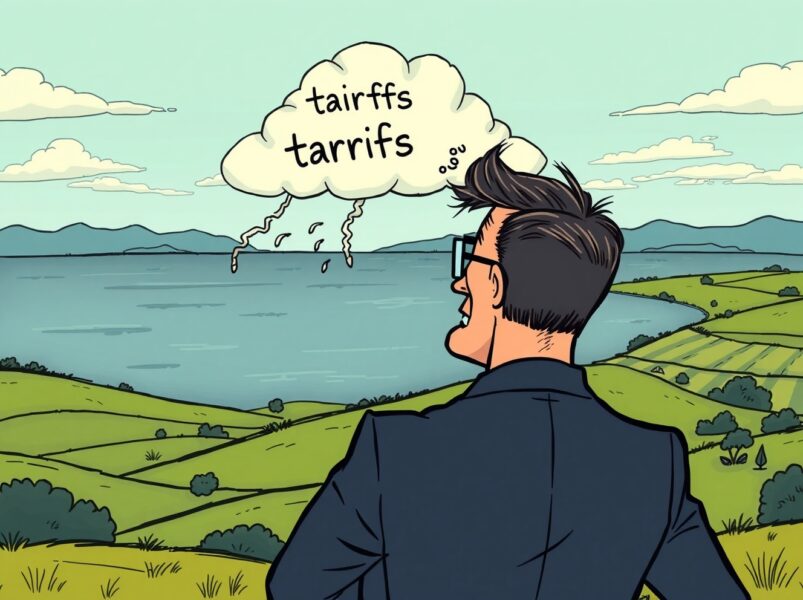BitcoinWorld

Surprising Insight: Citadel CEO Ken Griffin on Tariff-Driven Inflation’s Absence
In the complex world of global finance and economics, statements from influential figures often spark significant discussion. Recently, Ken Griffin, the esteemed CEO of U.S. hedge fund Citadel, offered a surprising perspective that challenges conventional wisdom. Griffin asserted that Tariff-Driven Inflation—the rise in prices due to taxes on imported goods—has not yet materialized in the economy. This insight comes at a time when many are closely watching economic indicators and the potential impact of trade policies.
What Exactly is Tariff-Driven Inflation, and Why Hasn’t It Arrived?
To understand Griffin’s statement, it’s essential to grasp what Tariff-Driven Inflation means. Tariffs are essentially taxes imposed by a government on imported goods or services. The primary goal is often to protect domestic industries or generate revenue. However, when these taxes are levied, they typically increase the cost of imported products. Importers might pass these higher costs on to consumers, leading to higher prices for goods and services across the board—a phenomenon known as inflation.
Many economists anticipate that significant tariffs would directly translate into inflationary pressures. However, Griffin’s view suggests that other economic factors might be offsetting or delaying this expected outcome. For instance, strong competition among global suppliers, shifts in supply chains, or even a dampening effect on demand could be mitigating the inflationary impact of tariffs. His observation invites a deeper look into the current economic climate.
The Federal Reserve’s Critical Role in Managing Economic Pressures
Beyond his insights on Tariff-Driven Inflation, Ken Griffin also touched upon the crucial role of the Federal Reserve. He stated that if he were president, he would allow the Federal Reserve to ‘do its job.’ This highlights a fundamental principle in economic governance: the independence of the central bank.
- Independence of the Fed: The Federal Reserve operates independently of political pressures to ensure its decisions are based purely on economic data and its dual mandate.
- Dual Mandate: The Fed’s primary objectives are to achieve maximum employment and maintain price stability. Managing inflation is a key part of this mandate.
- Monetary Policy Tools: The Fed uses tools like interest rate adjustments and quantitative easing to influence the money supply and credit conditions, thereby impacting inflation and economic growth.
Griffin’s comment underscores the importance of allowing expert institutions like the Fed to navigate complex economic challenges without undue political interference, especially when facing potential inflationary risks.
Decoding the Economic Landscape: Is Tariff-Driven Inflation Still a Threat?
While Griffin notes the current absence of significant Tariff-Driven Inflation, the question remains: is it still a potential threat? The global trade environment is constantly evolving, with new tariffs and trade agreements emerging regularly. Future shifts in trade policy, combined with other macroeconomic factors, could still trigger inflationary trends.
Consider these points:
- Global Supply Chains: Any major disruption or restructuring of global supply chains could amplify the impact of tariffs.
- Consumer Demand: A surge in consumer demand, coupled with increased import costs, could create the perfect storm for inflation.
- Geopolitical Factors: Geopolitical tensions can lead to new tariffs or trade restrictions, potentially impacting prices.
Griffin’s perspective serves as a reminder that economic outcomes are rarely straightforward. Various forces interact, and the timing and magnitude of economic phenomena like Tariff-Driven Inflation can be difficult to predict.
Concluding Thoughts on the Economic Horizon
Ken Griffin’s recent remarks offer a compelling snapshot of a seasoned investor’s view on current economic realities. His observation that Tariff-Driven Inflation has not yet arrived provides a moment for reflection on the multifaceted nature of economic forces. Furthermore, his emphasis on the Federal Reserve’s independent role reinforces the critical importance of sound monetary policy in maintaining economic stability. As global trade policies continue to evolve, and central banks navigate complex challenges, staying informed about expert insights like Griffin’s becomes invaluable for understanding the broader economic landscape.
Frequently Asked Questions (FAQs)
Q1: What did Ken Griffin say about tariff-driven inflation?
Ken Griffin, CEO of Citadel, stated that Tariff-Driven Inflation has not yet arrived in the economy, suggesting that the expected price increases from tariffs have not fully materialized.
Q2: What is tariff-driven inflation?
Tariff-Driven Inflation refers to the general increase in prices of goods and services that occurs when governments impose tariffs (taxes) on imported products, leading to higher costs for consumers.
Q3: Why might tariff-driven inflation not have arrived yet?
Several factors could mitigate the immediate impact of tariffs, such as strong global competition, adjustments in supply chains, or a general softening of consumer demand, which can absorb or delay price increases.
Q4: What role does the Federal Reserve play in managing inflation?
The Federal Reserve’s primary role includes maintaining price stability. It uses monetary policy tools, such as adjusting interest rates, to control the money supply and influence economic activity, thereby managing inflationary pressures.
Q5: Is tariff-driven inflation still a future concern?
While it may not have fully arrived yet, Tariff-Driven Inflation remains a potential concern. Ongoing changes in global trade policies, supply chain dynamics, and consumer demand could still trigger or amplify inflationary trends in the future.
Q6: Why did Ken Griffin emphasize the Federal Reserve’s independence?
Griffin emphasized the Fed’s independence to highlight the importance of allowing the central bank to make economic decisions based on data and its mandate, free from political influence, which is crucial for effective economic management.
If you found this article insightful, consider sharing it with your network to spark further discussion on current economic trends! Your engagement helps us bring more valuable perspectives to the forefront.
To learn more about the latest economic outlook trends, explore our article on key developments shaping global financial markets price action.
This post Surprising Insight: Citadel CEO Ken Griffin on Tariff-Driven Inflation’s Absence first appeared on BitcoinWorld.





